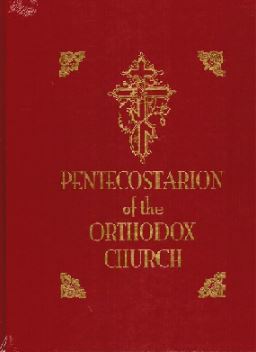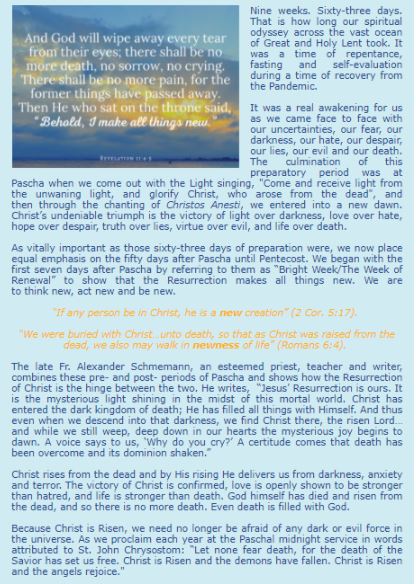SSCORRE!
Saint Sophia Cathedral
Online Resources for our Religious Edification
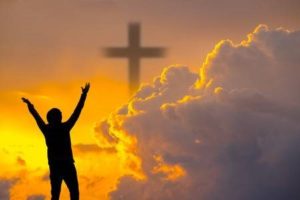
Topic of the Week – “Behold I Make All Things New”
“And so, the Feast of Feasts has passed by us: and the Royal Gates in the Lord’s temples are shut; and the service is no longer as triumphant as it was during Bright Week. What, then, brethren, has this feast left in our souls? Christian holidays, you see, do not pass before us, one after another, just to leave our souls idle, but in order to discharge us from the cares and affairs of life’s concerns; to put it another way: the Lord provides us with holidays in order that we might temporarily put aside thinking about, concerning ourselves with, rejoicing at, grieving over, that which is worldly, earthly, quick to pass; but, instead, that we might meditate upon, concern ourselves with, rejoice at, that which is heavenly and eternal. It was precisely for this reason, as well, that the holiday just past was given us…”
Excerpted from What Has the Feast of Pascha Left in Our Souls?
“…The Pentecostarion was so named because it refers to fifty days, from the day of Easter until the day of Pentecost. This period is associated with four major Despotic Feasts, namely…Pascha… Mid-
Pentecost… Ascension.. Pentecost…This Feast of Pentecost is celebrated by our Church for a whole week until the Sunday of All Saints, which shows that the purpose of the incarnation of the Son and Word of God is the sanctification of humanity, their theosis. If the period of the Triodion is characterized as a “solemn Triodion”, the period of the Pentecostarion is characterized as a “joyful” period. When one reads the troparia of that period, one observes that they are adorned by a theological wealth. The canons of the feasts have been made by great hymnographers and theologians… who connected the events of Holy Scripture with the wonderful homilies of the Fathers of the Church…
The Triodion and Pentecostarion are centered around Pascha. Before [Pascha] is a period of preparation and after this period is a period of spiritual fruitfulness. All the troparia connect theology with history, compunction with joy, Cross with Resurrection, union with Christ and the Holy Spirit…”
Excerpted from Homily Eight on the Sacred Liturgical Books of the Orthodox Church
Adult/Family:
“Nine weeks. Sixty-three days. That is how long our spiritual odyssey across the vast ocean of Great and Holy Lent took. It was a time of repentance, fasting and self-evaluation during a time of recovery from the Pandemic…
As vitally important as those sixty-three days of preparation were, we now place equal emphasis on the fifty days after Pascha until Pentecost. We began with the first seven days after Pascha by referring to them as “Bright Week/the Week of Renewal” to show that the Resurrection makes all things new. We are to think new, act new, and be new… Because Christ is Risen, we need no longer be afraid of any dark or evil force in the universe…”
Fr. John Vlahos, St. Paraskevi Greek Orthodox Church, Greenlawn, NY
Check out this Pentecostarion Resource Page
Preschool/Elementary:
Read and discuss about Doubting Thomas.
Middle School:
“The word Pentecost means “the fiftieth” and is used to designate the great event of the Outpouring of the Holy Spirit (Epiphoitesis) upon the Apostles and the Church on the 50th day of after the Resurrection of Christ, just ten days after His Ascension into Heaven… Since ancient times, the 50-day period from Pascha to Pentecost has been called Pentecost because what began with the Lord breathing the Holy Spirit on His Disciples was consummated with the full descent of the Spirit upon the Disciples and the whole Church. Thus, the Church was fully born and began to grow….”
Read more about this time period we are now observing in the Church From Pascha to Pentecost.
Read this Sermon for Thomas Sunday
High School:
“Throughout the current season of fifty days we celebrate the resurrection of our Lord and God and Savior Jesus Christ from the dead….
He alone resurrected Himself on the third day and, instead of returning again to the earth, He ascended into heaven, making our human substance share the same throne as the Father, being equally divine… The Lord’s resurrection has procured this bounty for us, and that is why the only feast we keep for so many days, seeing that it is immortal, indestructible and eternal, and thus prefigures the future blessedness of the saints, whence pain, sorrow and sighing shall flee away….
For this reason the grace of the Spirit ordained that before this present season we should pass the holy forty days in fasting, vigil, prayer and all kinds of training in the virtues. Through those forty days He shows that in this world the life of those being saved consists only of repentance and a way of life pleasing to God.
By means of these fifty days through which we are now passing, however, He demonstrates the ease and enjoyment which await those who have lived here and now in struggles for God’s sake….”
Read the entire homily On the Fifty Day Celebration of the Resurrection (by St. Gregory Palamas)
Read this Sermon for Thomas Sunday
A Message from Maria Spanos
I am passionate about our Orthodox Christian faith and seek to help others learn as much as they can about it. My purpose here is to share online resources that help strengthen our relationship with Christ and bind us closer to His Church. I believe they are invaluable in learning about our precious Orthodox Tradition, and are a great aid for teaching family members, friends and others about Orthodoxy. ~Maria
Two of my favorite quotes:
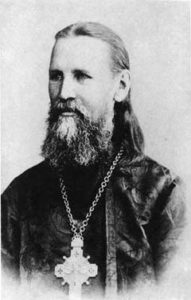 “A true Christian behaves in this life so that it may be a preparation for the future one and not only a life here below. In his actions, he does not think what will be said of him here but of what will be said there in heaven; he represents to himself that he is always in the presence of God, of the angels and all the saints, and remembers that someday they will bear witness of his thoughts, words, and deeds.” — Saint John of Kronstadt
“A true Christian behaves in this life so that it may be a preparation for the future one and not only a life here below. In his actions, he does not think what will be said of him here but of what will be said there in heaven; he represents to himself that he is always in the presence of God, of the angels and all the saints, and remembers that someday they will bear witness of his thoughts, words, and deeds.” — Saint John of Kronstadt
__________________________________________________________
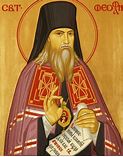
“Of all the holy works, the education of children is the most holy.”
— St. Theophan the Recluse


